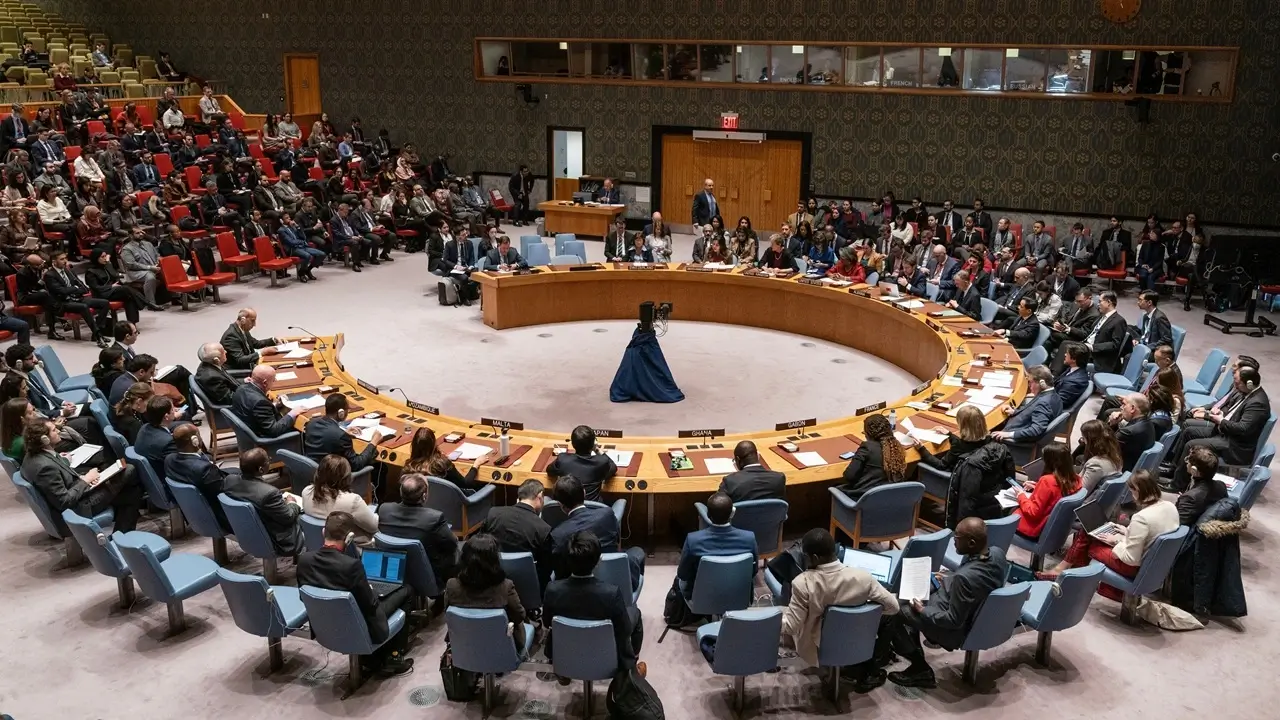
If international law no longer serves as its own barrier to cross-border aggression, well-armed alliances need to stand up for it—or risk seeing a beneficial world order come to ruin.
Does international law still exist? Surveying the daily news, it’s hard to escape the feeling that the law of the jungle—the law of raw power that ruled international affairs from antiquity until relatively recent times—has overtaken the principle that international frontiers may not be amended by force of arms. Founded after the trauma of World War I, the League of Nations sought to sanctify that fundamental precept in international law, along with the principle of self-determination. Self-determination is the notion that peoples that define themselves as nations have the right to their own nation-states, rather than be forced to live under the rule of alien peoples.
Despite its lofty aspirations, the League could never summon the unanimity or fortitude to fight for its own principles—and so World War II came. Following the defeat of the Axis, the victors founded the United Nations, a supposedly more resolute, musclebound international fellowship to enforce the “collective security” principle that aggression against one is aggression against all and warrants a combined response from all.
Why the United Nations No Longer Works
But the Cold War stalled the United Nations—and in particular the UN Security Council, the principal guarantor of international peace and security—within scant years after the world body debuted at San Francisco.
The reason why is plain. The structure of the UN system lends itself to gridlock. Any one of the five permanent members of the Security Council—Russia, China, the United States, Great Britain, and France—can block a use-of-force resolution. Accordingly, the United Nations will almost always remain inert in times of grave peril.
Amazingly, there have been exceptions to this rule—two in particular. By a remarkable diplomatic fluke, the Truman administration managed to muster a joint US-UN counterattack to repulse the North Korean onslaught against South Korea in 1950, and subsequently to blunt China’s armed intervention in that struggle. The campaign restored the inter-Korean frontier, albeit at heavy human cost.
The Korean “police action” was basically the sum total of UN peace enforcement efforts until 1990, when an unusually villainous aggressor, Iraq’s Saddam Hussein, launched a flagrant act of cross-border aggression against a neighbor and sovereign UN member, Kuwait. That unusual moment of clarity made combined action possible for a second time. With the clear authorization of the UN—and without objection from the Soviet Union, then in its death throes—America assembled a coalition of 35 nations and kicked the Iraqi Army out of Kuwait in short order.
Since liberating Kuwait in 1991, though, the United Nations has resumed its lackluster record for upholding basic principles. Two of the five permanent Security Council members, China and Russia, have made plain their intentions to revise the world order over which they ostensibly help preside.
Xi Jinping and Vladimir Putin are superempowered spoilers within the system. No resolution designed to reinforce the post-World War II order can get by them. Inaction prevails even as great powers go on the march against lesser ones. Ukraine is under extreme duress, having lost some 20 percent of its territory to the Russian Army. Every day the People’s Liberation Army threatens to extinguish liberal self-government on Taiwan, at the same time it deploys regular and irregular naval forces to wrest control of offshore islands and waters from China’s Southeast Asian neighbors. Worse, Russia and China are substantial nuclear-weapon states—only compounding the dilemma of how to defend victims of aggression. Few relish challenging a nuclear-armed antagonist.
Echoes from Melos
And so it feels like the age of Thucydides has returned.
The great chronicler of the Peloponnesian War, the fifth-century-BC struggle between rival leagues headed by Athens and Sparta, cautioned that power trumps justice in international affairs. One cannot expect justice unless one has the power—specifically military power—to demand it. Thucydides observed darkly that the strong do as they will in world affairs, while “the weak suffer what they must” when their interests collide with those of the strong. “Questions of justice,” he counsels, “arise only between equals.” In other words, you’d better arm yourself—or ally with powerful friends—if you expect fair treatment from predators.
The destruction of the Greek city-state of Melos (416 BC) at the hands of Athens, one of the superpowers of the Aegean world, prodded Thucydides to enunciate this hardscrabble axiom of international politics. An Athenian delegation warned inhabitants of the strategically located island that they would face dire consequences if they refused to join Athens in its decades-long war against Sparta and the Peloponnesian League. They also warned the Melians not to expect reinforcements from overseas. After all, the Athenian navy—the preeminent fighting force of the age—ruled the waves. Athenian mariners could make the wine-dark sea into an impassable moat blocking any Spartan relief flotilla.
Melian leaders balked. Even though they lacked adequate wherewithal to fend off assault, they refused Athens’ demands, hoping that the Athenians’ bluntly aggressive and immoral actions would rally Sparta and other small city-states to their cause. But their calls for help went unanswered, and after the city fell, the Athenians made good on their threats—summarily slaughtering the city’s male population and enslaving the women and children. For Thucydides, a moralist as well as an astute historian, the butchery dramatized the fateful consequences when a society lacks the armed strength to back up an assertive diplomatic posture.
Will Realism Reign Triumphant?
Like it or not, diplomacy has come to rest once again on a foundation of hard power. Now as in classical Greece, weaker states cannot negotiate an equitable agreement when a rival combatant is possessed of the armed might, the willpower, and the malice to forcibly impose its demands. They find themselves in a distinctly Melian predicament.
Thucydides’ warning against martial infirmity applies alike to the present-day standoffs embroiling the Black Sea and Western Pacific theaters. If international law no longer serves as its own barrier to cross-border aggression, well-armed alliances will need to stand up for it—or risk seeing a beneficial world order come to ruin. Let’s not consign Ukraine, Taiwan, and other beleaguered states to a Melian fate.
Source:https://nationalinterest.org/feature/who-will-defend-liberal-world-order-jh-090525


